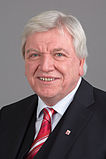You can help expand this article with text translated from the corresponding article in German. (March 2018) Click [show] for important translation instructions.
|
| |||||||||||||||||||||||||||||||||||||||||||||||||||||||||||||||||||||||||||||||||||||
All 137 seats of the Landtag of Hesse, including 27 overhang and leveling seats 69 seats needed for a majority | |||||||||||||||||||||||||||||||||||||||||||||||||||||||||||||||||||||||||||||||||||||
|---|---|---|---|---|---|---|---|---|---|---|---|---|---|---|---|---|---|---|---|---|---|---|---|---|---|---|---|---|---|---|---|---|---|---|---|---|---|---|---|---|---|---|---|---|---|---|---|---|---|---|---|---|---|---|---|---|---|---|---|---|---|---|---|---|---|---|---|---|---|---|---|---|---|---|---|---|---|---|---|---|---|---|---|---|---|
| Turnout | 2,881,261 (67.3%) | ||||||||||||||||||||||||||||||||||||||||||||||||||||||||||||||||||||||||||||||||||||
| |||||||||||||||||||||||||||||||||||||||||||||||||||||||||||||||||||||||||||||||||||||
 Map of the election, showing the winner of each single-member district and the distribution of list seats. | |||||||||||||||||||||||||||||||||||||||||||||||||||||||||||||||||||||||||||||||||||||
| |||||||||||||||||||||||||||||||||||||||||||||||||||||||||||||||||||||||||||||||||||||
The 2018 Hessian state election was held on 28 October 2018 to elect the members of the Landtag of Hesse.[1] The outgoing government was a coalition of the Christian Democratic Union (CDU) and The Greens led by Minister-President Volker Bouffier.
The election was held two weeks after the 2018 Bavarian state election, which saw the CSU and Social Democratic Party (SPD) suffer major losses, with third parties making major gains. The result in Hesse was largely similar, with the CDU and SPD losing more than 20 percentage points between them, while the Greens and Alternative for Germany (AfD) gained approximately 9 points each. The Free Democratic Party (FDP) and The Left also made gains. Compared to the 2013 election turnout fell by 5.9 points to 67.3%.[2]
Despite suffering the worst losses of any party, the CDU remained the largest party by a comfortable margin. The Greens and SPD each won 29 seats and 19.8% of the vote; the Greens moved into second place by an extremely narrow margin of just 66 votes. The AfD, which failed to win seats in 2013, won 13.1% and 19 seats. By entering the Landtag in Hesse, it became the only third party present in all sixteen state parliaments.
The election was influenced by the poor condition of the federal government in the aftermath of the "asylum quarrel" in June/July and the crisis around Hans-Georg Maaßen in September.[3][4] One day after the election, federal Chancellor Angela Merkel announced that she would not seek re-election as CDU leader at the party convention in early December, nor seek her party's nomination as Chancellor candidate for the next federal election.[5]
The incumbent CDU–Green government was returned with a slim majority of one seat, and was subsequently renewed.
- ^ "Wahltermine in Deutschland (2021, 2022 usw.)".
- ^ https://statistik-hessen.de/l_2018/html/landesergebnis Archived 2019-06-18 at the Wayback Machine Official result
- ^ Was die Hessenwahl für die Bundespolitik bedeutet, Frankfurter Allgemeine, 28 October 2018
- ^ Schicksalswahl für Merkels Koalition, Frankfurter Allgemeine, 26 October 2018
- ^ Angela Merkel bietet Verzicht auf Parteivorsitz an, Die Zeit, 29 October 2018







